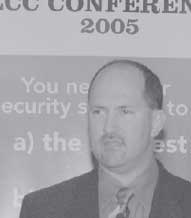Presented By
Jim Dworkin,
Security Business Development and
FAE Manager, Freescale Semiconductor
In his presentation, Dworkin discussed how the amount of digital content being handled by a network and the increased complexity of attacks is changing the role of the processor well beyond its original function.

Traditionally, network equipment has used discrete security processors, but the security functions are merging into integrated processors as manufacturers like Freescale try to provide a single chip that performs all security functions across multiple layers of the protocol stack. But as Dworkin pointed out, this only addresses crypto-based security and content processing, which may not be enough security in some applications if the software running on a device cannot be trusted. To be truly secure, while still realizing performance benefits, organizations need a trusted embedded computing environment – a hardware-based, software security architecture that leverages the power in today’s communications processors.
Dworkin explained that Freescale’s PowerQUICC processors with integrated security engines are designed to accelerate industry standard algorithms in hardware. Freescale’s PowerQUICC processors accelerate ECC public-key operations as a viable market alternative to RSA and other public-key schemes to enable new levels of security for services such as SSL and IPSec in those applications that demand ECC. By integrating hardware acceleration for ECC, Freescale recognizes that the market values ECC as a viable commercial public-key algorithm. Furthermore, trusted platform services such as secure software and trusted boot can be found on Freescale’s i.MX series of applications processors for mobile computing environments.
This issue of Code & Cipher reviews the first annual Certicom ECC Conference and summarizes some of the key discussions at the event.